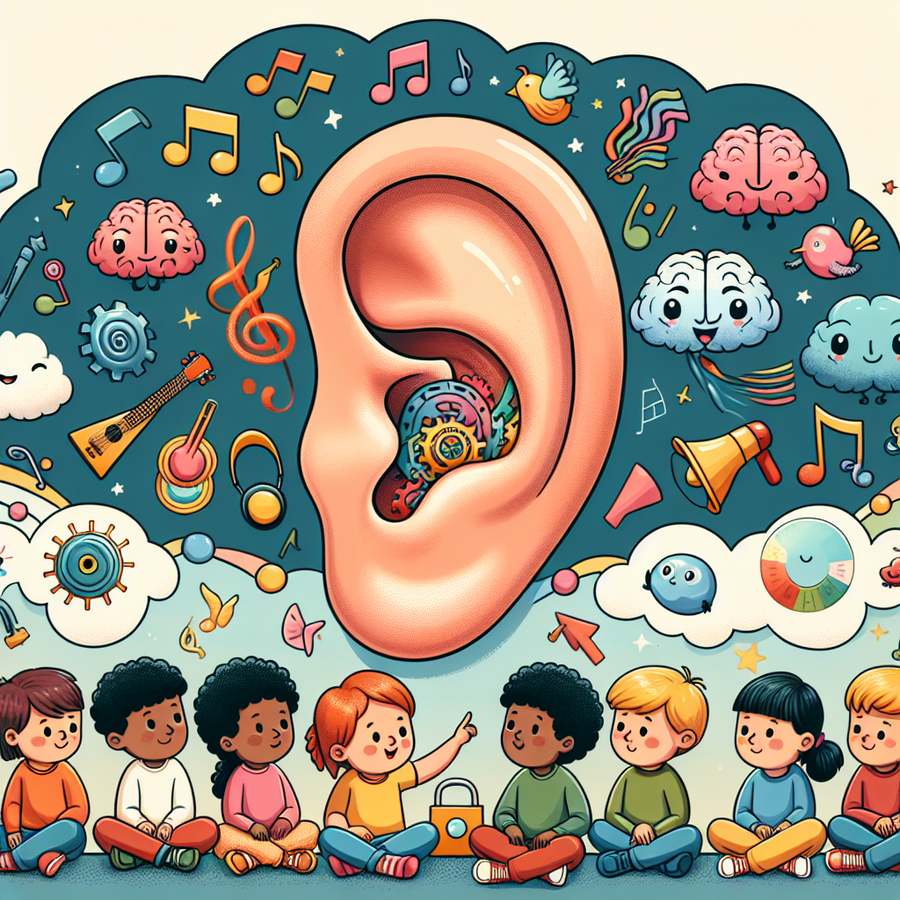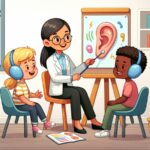Auditory processing plays a pivotal role in how children interpret and interact with the world around them. It involves the brain’s ability to analyze and make sense of the sounds it hears. For new parents, understanding auditory processing and its potential disorders can be crucial for early identification and support. This comprehensive guide delves into auditory processing, signs of auditory processing disorder (APD), and strategies to enhance your child’s auditory skills.
What is Auditory Processing?
Auditory processing refers to the brain’s ability to interpret sounds. Unlike hearing, which is the physical ability to detect sound, auditory processing involves the higher-order skills of analyzing and giving meaning to noise. This distinction is essential for parents to understand, as a child may have normal hearing but still struggle with auditory processing tasks.
Children with auditory processing difficulties may find it challenging to follow spoken directions, distinguish between similar sounds, or focus on a voice amid background noise. These challenges can affect learning, social interactions, and overall development. It’s important for parents to recognize these signs early and seek appropriate intervention.
Signs Your Child May Have Auditory Processing Disorder (APD)
Auditory Processing Disorder (APD) is a condition where the brain has difficulty processing sounds correctly. Children with APD may pass standard hearing tests but still struggle to comprehend verbal instructions or recognize differences in sounds. APD can manifest in various ways, and being aware of the signs is the first step towards getting the right support.
Common signs of APD in children include difficulty following spoken directions, especially multi-step ones, being easily distracted by background noise, and misunderstanding questions. Additionally, these children might have poor listening skills, difficulties with reading and spelling, and a tendency to ask for repetitions. If you notice these signs, consulting with an audiologist specialized in APD can provide a clearer understanding and pathway to support.
Supporting Children with Auditory Processing Difficulties
Supporting a child with auditory processing difficulties involves a multi-faceted approach. Creating a conducive learning environment, seeking professional help, and using specific strategies at home can significantly benefit these children. Parents play a crucial role in their child’s development and can implement various techniques to improve auditory processing abilities.
Strategies include reducing background noise at home, giving clear and concise instructions, and encouraging activities that strengthen auditory skills, such as music lessons or listening games. Additionally, educational accommodations, like sitting closer to the teacher or using auditory aids, can make a significant difference in a child’s learning experience. For more insights, consider visiting our detailed guide on auditory processing.
When to Seek Professional Help for Auditory Processing Issues
If you suspect your child has difficulties with auditory processing, seeking professional help is essential. An audiologist can conduct specialized tests to assess auditory processing abilities and determine if your child has APD. Early intervention can make a significant impact on your child’s ability to communicate and learn effectively.
Besides an audiologist, other professionals such as speech-language pathologists and educational psychologists can offer support and strategies to help your child. It’s important to work as a team to create a comprehensive support plan tailored to your child’s needs. For resources and support on related topics, visit hearing tests, language development, and learning disabilities.
Enhancing Your Child’s Auditory Development
Auditory development is a continuous process that begins before birth and continues into adolescence. Parents can play a pivotal role in fostering a rich auditory environment that promotes healthy auditory processing skills. Engaging with your child through conversation, reading aloud, and exposing them to a variety of sounds can stimulate auditory development.
Activities such as playing ‘Simon Says,’ using audio books, and encouraging musical activities are fun ways to enhance auditory processing skills. Remember, each child is unique, and what works for one may not work for another. Observing your child’s response to different auditory stimuli and adjusting accordingly is key to supporting their auditory processing development.
Conclusion
Understanding auditory processing and its potential challenges is crucial for new parents. By recognizing the signs of auditory processing difficulties and implementing supportive strategies, parents can provide the necessary support to help their child navigate the complexities of communication and learning. Remember, early identification and intervention are fundamental to fostering successful auditory processing capabilities and ensuring your child reaches their full potential.
For more resources and guidance on related topics, explore our website and consider consulting with professionals who specialize in auditory processing and developmental milestones. Your journey as a parent is filled with learning and discovery, and by staying informed, you can provide the best support for your child’s growth and development.













